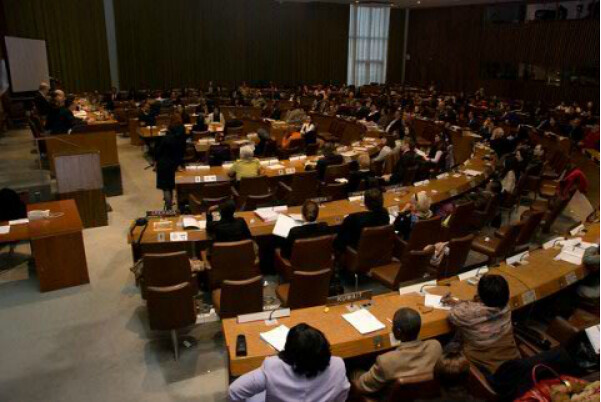“The world is suffering not only because of the actions of evil people but because of the silence of good people.” This challenge to speak up was issued by Aliya Khan, a Muslim speaker at the Youth Interfaith Leaders Forum held at the United Nations Headquarters in New York on December 2, the fourth in a series of recent interfaith youth forums on human rights organized by the Universal Peace Federation.
A young Lutheran from Moldova, Anastasia Dragan, echoed the conviction that people of faith should speak out against injustice: “The church becomes guilty if she is quiet where she should speak.”
These were two of nine young representatives of various faith traditions at the conference on Interfaith Cooperation and the Protection of Human Rights and Dignity sponsored by the Permanent Missions of Guinea, Ethiopia, Kenya, and Nepal and coordinated by the Universal Peace Federation Office of UN Relations on September 2, 2008.
Rabbi Roger Ross, Executive Director of The New Seminary for Interfaith Studies in New York City, moderated the discussion. He offered for the young people's consideration several questions that have been baffling some of the wisest minds of our time: "How do we reverse the hijacking of religion? How do we change hating in the name of the divine to loving in the name of the divine? How do we promote the culture of peace in which we can promote human rights and dignity?"
Speaking with conviction and passion from the podium in the wood-paneled committee room 1, the young faith leaders addressed political and religious leaders, professors, peace activists, along with permanent representatives to the UN seated behind their country’s official nameplate.
A Christian youth, Matt Redmond, said, “Faith has sustained me in the challenges of life and will guide me in life. We believe God wants us to live in peace.” Education has an important role, and he called upon the audience to challenge the ideologies of fear and give children more positive and peaceful alternatives to religious extremism.
A Muslim student at UTS Interfaith Seminary from Turkey, suggested beginning with an introspective approach. She quoted the Sufi poet Rumi:
I was looking for God.
I went to synagogues, and I couldn’t find God.
I went to churches, and I couldn’t find God.
I went to mosques, and I couldn’t find God.
I went to temples, and I couldn’t find God.
Then I went home, I found out that God is in my heart!
Speakers proposed various analogies for commonalities among religions. One speaker drew on a modern business model and considers God like a CEO and various religions as branches of one entity. Juliet Rabia Gentile, a Muslim, advocated a mysticism that does not concern itself with material distractions but with the one path that leads to God.
The catalysts on their spiritual paths have been varied. For Justin Fong, from the Youth Federation for World Peace, it was the 9/11 attack on the World Trade Center. For Jay Little, a Scientologist, it was the realization that science alone did not have all the answers. For Rama Engle, a student at The New Seminary, an awareness of commonalities came only experientially, by attending mosques, synagogues, and churches.
A Catholic from the Philippines, Daria Mendoza, took a pragmatic approach: “This world is not just mine. It’s not just yours. It is our world. There are two options: live together in peace and harmony, or split the world into pieces.” Not surprisingly, she opts for the first alternative.
“We aren’t the leaders of tomorrow; we are the leaders of today,” asserted one speaker. Conference co-chair H.E. Anwarul C. Chowdhury considers young people to be the front line of the global interfaith. The former UN Under-Secretary-General and High Representative says with approval, "They are more forward looking.”
Echoing a theme in the recent US presidential elections, one speaker probably spoke for many when he said, “We are the change we have been waiting for.” While the youth offered no novel intellectual answers, they demonstrated their potential as catalysts. After the session ended, each young presenter was surrounded by members of the audience, eager to continue the discussion.
To read the presentations made at the Interfaith Youth Leaders Forums see the UPF.org portal on human rights. On this portal are reports of recent forums about interfaith cooperation and human rights and texts of other presentations at the events.

